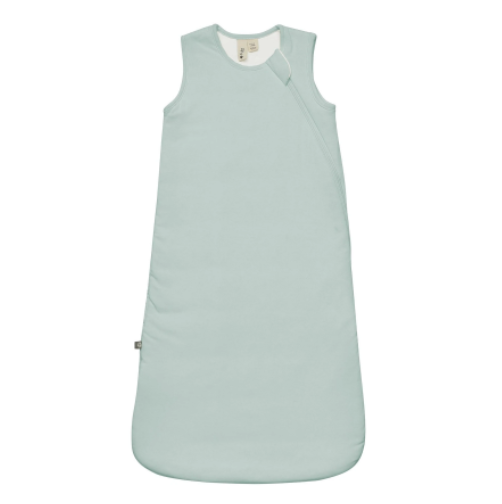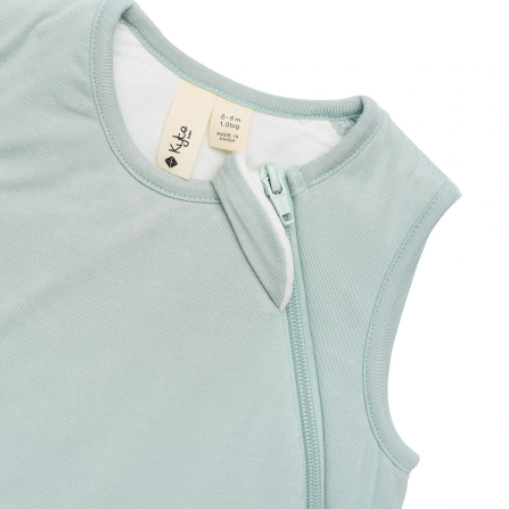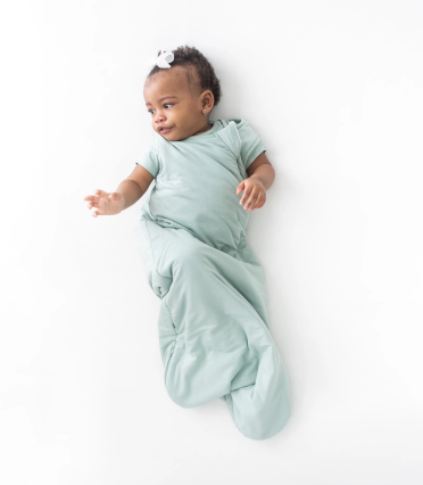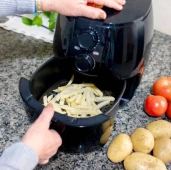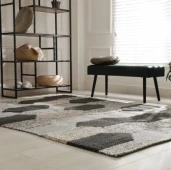Ultimate Guide to Kyte BABY Sleeping Bags
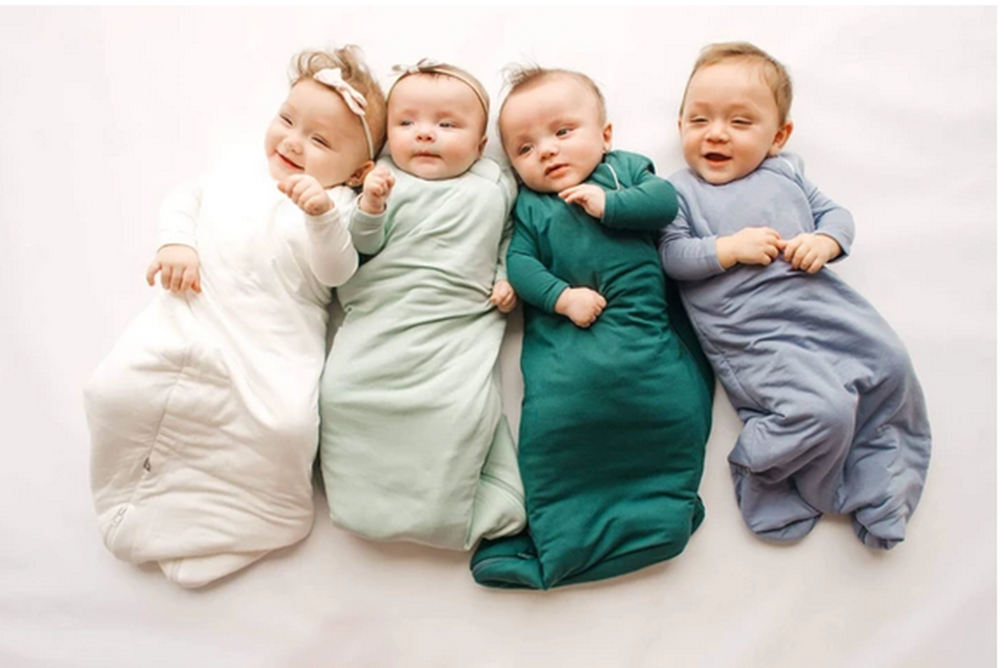
The rate of Sudden Infant Death Syndrome (SIDS) has decreased significantly over the past few decades thanks to the strict guidelines of the American Academy of Pediatrics (AAP). Now that we've learned a lot more than we did in the past, we can sleep a little easier at night knowing that we're following the guidelines for a healthy night's rest for our sleeping babies. These rules include no stuffed animals or pillows in the crib until the baby is at least 12 months of age; this includes loose bedding. The fact that these can suffocate children is now well-known, and they are a major safety hazard for children of all ages.
So, how are you going to keep your baby warm if you can't even wrap them up in a blanket? There is a simple solution: a sleep bag. When it comes to creating the perfect little nest for our babies to sleep peacefully, it can feel like a bit of a guessing game. How comfortable are they? How many layers do they need, or do they not? Sleeping Bags' TOG ratings are also interesting. If you're not sure how to keep your baby warm and cozy this fall and winter, Kyte BABY Sleep Bag has got you covered and we've got some advice for you.
WHAT EXACTLY IS A SLEEPING BAG?
A sleep bag is a kind of of sleepwear that serves as a wearable blanket. 0.5 TOG, 1.0 TOG and 2.5 TOG Kyte BABY sleep bags are available so that you can choose the right thickness and warmth for the season. shop here.
BENEFITS OF USING A SLEEP BAG
Lower SIDS Risk
Keep your baby warm because babies are unable to regulate their own body temperature, which is essential to their health. Using a wearable blanket like the Kyte BABY sleep bag is a great way to keep your child safe, warm, and cozy. It provides all the warmth and security of a blanket, but without the danger of suffocation.
It Serves As a Cue for Bedtime
It's important for children to have a bedtime routine because it improves their quality of sleep. Children learn by doing before they can understand what they hear or see in books or movies. With a consistent bedtime routine, your child will know when it's time for them to go to sleep. Zipping your baby into a sleep bag creates a strong sleep association that persists even during periods of disruption or transition, such as teething and sleep regressions.
Avoids Tangles in the Crib Slat
Before the 1990s, crib bumpers were commonly used to keep babies' heads and limbs from falling through the crib slats, but they should never be used on a baby under the age of 12 months. In some cases, babies may wake up because their foot gets caught between the slats of the crib. There are many who have adapted to this, but using a sleep bag keeps those little legs from flailing and becoming tangled in the mattress or box spring.
It Prevents Your Child from Climbing Out
This is especially useful if you're dealing with a climber. When children are able to walk and talk, the growth is tremendous. Once crawling, they're soon walking, climbing, and pushing themselves to the limit—as well as you! No matter how many times they try to climb out of their crib, it's important to keep an eye on them. It's dangerous and can lead to injuries, so be careful. To ease the transition from crib to bed, use a sleep bag as an option for the little ones. Because your child is unable to lift their leg over the crib rail, it discourages climbing, which can lead to injury.
It Stops Your Child from Removing Their Diaper
When your child is old enough to remove their own diaper, it's a joyous occasion. Checking on your sleeping, angelic (or so you thought) baby in their crib and discovering that not only are they bare-bottomed, but that the sheets are wet. For any parent, it's a difficult time, and unfortunately, it's not unheard of. This may be a sign that they are ready for potty training, but babies and toddlers do it for the sake of the novelty. A sleep bag saves the day once more. Your child will be unable to remove his or her diaper if he or she is unable to get to it.
Click here to shop some of the best Kyte BABY sleep bags for your little ones and get benefit from the perks of sleeping bags.
Kyte BABY SLEEPING BAG FAQs
When Can A Baby Wear A Sleeping Bag?
It's entirely up to you whether or not you want to start using a sleep bag with your child as soon as they are born. Although swaddling is recommended for newborns, there is no law requiring it. The American Academy of Pediatrics (AAP) advises against swaddling newborns until they are 8 weeks old or show signs of rolling over (whichever comes first). It's time to get rid of the swaddle and use a sleep bag instead. Even though your baby's sleep may suffer temporarily without the swaddle, the sleep bag will quickly become a refuge for your child. To ensure that you're using the correct size sleep bag for your baby, you should always check your child's height and weight against the Kyte BABY sizing charts.
When Should A Baby Stop Wearing A Sleeping Bag?
Your child does not have to stop using a sleep bag at a specific time. Every baby and toddler is unique and has a unique set of needs and preferences. It's possible that some children will outgrow a sleep bag by the time they're 1 year old, while others will continue to use it into their toddler years. At around the age of three or four, many children have difficulty using a loose blanket. It's common for them to kick off blankets, especially since young children frequently toss, turn, and roll around the crib or bed at night. If you're still using a sleep bag in the correct TOG, you can rest easy knowing that your child is well-protected and warm at night. Simply switch to a Sleep Bag Walker if your child's sleep bag becomes a tripping hazard while they are walking. Having open cuffs for their feet means that they can walk freely while wearing this version! It's ideal for protecting little ones from the cold while still allowing them to move around comfortably.
What If My Infant Is Capable Of Unzipping The Sleep Bag?
There is a chance that your baby or toddler will figure out how to unzip and remove the sleep bag. A problem like this should be taken seriously if your little Houdini is under the age of a year. There is a fine line between making sure that the sleep bag is safe and making sure that your baby is comfortable. What's the answer? What are you going to do with this? When it comes to finding a solution, this one is laughable. Even the most skilled of escape artists will be unable to unzip and remove the garment if you simply flip the sleep bag so that the zipper is on the baby's back.

